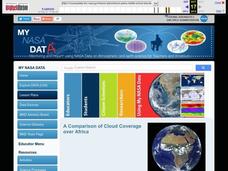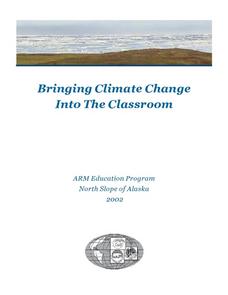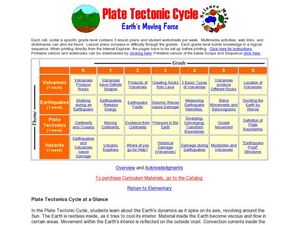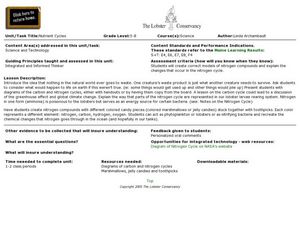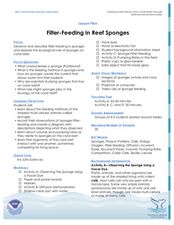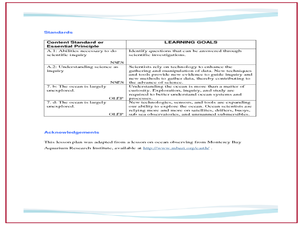Curated OER
Google Earth Geology Field Trip
Students take a virtual field trip around California using Google Earth. For this geology field trip lesson, students explore landforms and a variety of rocks located in California. Students compare environments where rocks are formed....
Curated OER
A Comparison of Cloud Coverage over Africa
Students identify different climate regions and local weather patterns. In this cloud coverage lesson students use NASA satellite data and import it into Excel.
California Academy of Science
Carbon Cycle Role Play
Anytime you make concepts clear with role playing or hands-on experience, it's a win for the whole class. Ping-Pong balls are used to represent carbon in a carbon cycle role-play activity. In small groups, children first discuss what...
NOAA
Graphing Temperatures
Battle of the hemispheres? In the fourth installment of a five-part series, young oceanographers use the NOAA website to collect temperature data from drifters (buoys), one in the Northern Hemisphere and one in the Southern Hemisphere....
PBS
Mountains and Rain Shadows
Scholars use an online interactive to learn just how different the other side of the mountain actually appears. They use satellite images, graphics, and videos to compare the impact of winds, oceans, clouds, precipitation, and more on...
Curated OER
Bringing Climate Change Into the Classroom
High schoolers investigate the greenhouse effect and examine the potential effects of climate change in the Arctic. They construct a mini-greenhouse and test its effect on temperature, analyze historical climate statistics, and conduct...
Curated OER
End of WWI: The Treaty of Versailles
After learning about the causes and closure of WWI, hand out this resource on that outlines the differences between Wilson's 14 Point Plan and the Treaty of Versailles. The class reads the information provided then analyzes two political...
K5 Learning
Why Does the Ocean have Waves?
Six short answer questions challenge scholars to show what they know after reading an informational text that examines waves—what they are, what causes them, and how different Earth factors affect their size and strength.
Curated OER
How Coal Was Formed
Learners consider four diagrams of the Earth's crust, and decide which diagram best fits with the four descriptions on the worksheet. A simple, yet effective teaching tool.
NOAA
Calling All Explorers
Let's get moving! The second installment of a 2-part series of six adventures helps learners take part in individual explorations by sea and by land. After navigating the waters in an informative WebQuest, groups create and hide their...
NOAA
Animals of the Fire Ice
When the sun's rays can't reach the producers in a food web, where does all the energy come from? Extreme environments call for extreme food sources. Young scientists investigate creatures that appear to get their energy from methane...
Curated OER
Plate Tectonic Cycle
Students explore the Earth's movements by completing worksheets. In this plate tectonics lesson plan, students define such natural disasters as volcanoes, earthquakes, tsunamis and mudslides and discuss their connections to plate...
Curated OER
The Nutrient Cycles
Students investigate the circle of sea life by creating nitrogen compound models. For this oceanography lesson, students discuss sea creatures and where their waste goes. Students identify nitrogen cycles in the ocean by viewing...
Curated OER
Filter Feeding in Reef Sponges
Young scholars investigate the role of sponges in our oceans. In this biology lesson, students create a diagram visualizing how sponges bring food into their bodies through a filtering process. Young scholars discuss the connections...
Curated OER
Researching the World's Oceans
Students research and compare important features of the oceans based on current data. They examine the globe or map, determine the major oceans of the world, and record their names on the data sheet.
Curated OER
Trash Traits: Marine Debris, Litter, Ecology, Oceans
Pupils perform experiments to examine whether trash can float, blow around, or wash away. The effects of these characteristics on the presence of marine debris in the environment are then discussed.
Curated OER
Clothes World: Beginning ESL lesson
Take a tour around the world with this ESL presentation about international clothes. From South African tribal wear to Scottish kilts, your English learners will appreciate the vivid pictures and clear country labels for each slide. The...
Curated OER
Ancient Middle East Geography
As part of a study of ancient Middle East geography, kids locate seas, rivers, regions, and cities on a map of the region.
Curated OER
The Search for El Nino
Sixth graders complete an El Nino scavenger hunt. In this earth science lesson plan, 6th graders describe the conditions that create El Nino and compare it to normal condition. They discuss how this phenomenon affects marine ecosystem.
Curated OER
The Volcano Factory
Collaborative groups work together to report on the volcanic activity leading to island formation and construct models to demonstrate the process. Consider having each group present their project to the rest of the class. There are many...
Curated OER
One World Ocean
Students compare and contrast the properties of salt water in the oceans/seas and freshwater elsewhere on the planet. They also analyze mixing caused by currents in the ocean, including the effects of warm and cold water as well as with...
Curated OER
Rubber Duckies and Ocean Currents
Students explore marine life by conducting a rubber duck experiment. In this water currents lesson, students practice identifying latitude and longitude coordinates on a map and define the currents of major oceans. Students discuss the...
Curated OER
Introduction to Ocean Grazers
Students explore biology by creating a poster with classmates. In this oceanography lesson, students identify the importance of coral reefs to the ocean's ecology and examine a food web of ocean animals. Students define a list of...
Curated OER
Ocean Observations
Young scholars examine a coastal ocean. In this physical science/earth science activity, students generate a list of questions about how researchers study the ocean. In addition, young scholars investigate, through research on the...
Other popular searches
- Math Lessons on Oceans
- Pre K Lessons on Oceans
- Prue K Lessons on Oceans
- Drama Lessons on Oceans
- Pr K Lessons on Oceans



